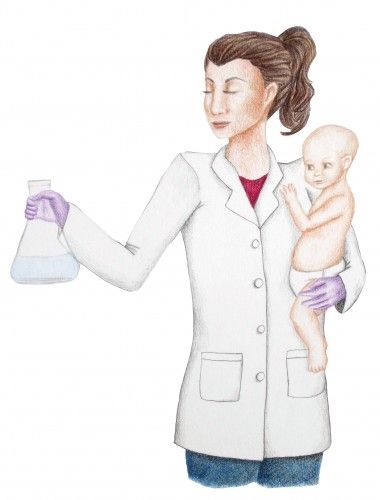
Thirty years ago, when my mother was choosing a graduate school, she sat down with her research advisor to discuss a theoretical chemist whom she hoped to work for at a prestigious northeastern institution. She was disappointed to learn that she had no chance of studying under this scientist, simply because she was a woman: “He had previously taken two women into his PhD program who both decided that they were going to have children and weren’t going to go get academic jobs. And he just said, ‘I’m not going to put in the investment there again.’”
source: Rutgers Press
My mom happily enrolled at UC Berkeley instead, where my dad was employed as a postdoc. Parenthood would eventually impact my father’s career decisions as well, but not because he took paternity leave or packed up early to pick me up from school. Instead, some nights he came home well after my bedtime, delayed by the extra breadwinning responsibilities he sought out in those days.
Stories like these and the statistics that go with them form the subject of Do Babies Matter? Gender and Family in the Ivory Tower, a new book from a team led by UC Berkeley law professor Mary Ann Mason. The book compiles data from the national Survey of Doctorate Recipients, several polls of the UC system, as well as anecdotes from online higher education forums.
Their conclusion—that motherhood and academia are frequently incompatible pursuits—will hardly surprise academics of any generation or gender (see “Narrowing the divide”). For those who might still need to be convinced, the facts and figures presented are more than persuasive. Mason hopes Babies will reach professors-to-be as early as college. “I’d like to give them some idea of what they’re getting into. Women are being told they can do anything that men can do, but they can’t…yet.”
The author’s full life cycle approach to the topic is unique and will appeal to readers of all career stages, from graduate school to retirement. Mason and her co-authors also carefully invert each of their inquiries (e.g. investigating the effect of parenthood on careers and the effect of careers on parenthood), deftly avoiding premature attributions of causality. While this approach lends Babies valuable credibility, it is at times tiresome, and the book reads a bit too much like a census-taker’s tome than its more literary-minded readers might like.
The long parade of percentages is peppered, however, by some unexpected findings. For example, even when compared to their counterparts in medicine and law, academics nonetheless lag in marriage and fertility rates, irrespective of gender. Additionally, female assistant professors act in university service positions at higher rates than men, putting in many extra hours that rarely factor into tenure considerations.
But by far the pride and joy of Babies is its final chapter, which brims with hearty suggestions for modernizing (and baby-proofing!) the ivory tower—from overhauls of government funding policies to no-cost scheduling switches that any department chair could enact tomorrow. Many of the recommendations draw upon lessons learned during their implementation at UC Berkeley, where some of the most progressive policies in the nation set an inspiring example for institutions worldwide.
 credit: Jo Downes
credit: Jo Downes
In this way, Babies is best not read straight through, but rather kept close by as a handbook of statistics and suggestions. And where that handbook ends, a conversation must begin, starting with the questions that Babies does not answer: What if a student is not ready to have children in graduate school, when it is supposedly “best” for her career? Could the job market accommodate an influx of newly welcomed parent-academics, when professorial positions already seem scarce? Will more aggressive family-friendly policies overburden childless faculty members with additional departmental responsibilities?
At the heart of these questions lie not women’s issues, or even family issues, but the larger issue of the unreasonable expectations placed on academics of all genders and familial statuses. My mother scoffs that many of her colleagues, childless and otherwise, consider a 60- to 80-hour workweek to be reasonable. “That’s just wrong!” she once told me, fiercely. “It’s wrong. There’s nothing about the job we do that requires that sort of thing. Nothing.”
If she’s right, the family-friendly policies proposed by Babies will just treat the symptoms, not the disease—perhaps the impossibility of being a mother in academia is as much related to the impossibility of academia as it is to motherhood. In this case, it is time that we redefine academic success as something more compatible with healthy lifestyles of all kinds. Mason herself remains optimistic: “All it takes is a few people at the top and some good data. Don’t lose courage and don’t give up!”
This article is part of the Spring 2014 issue.



